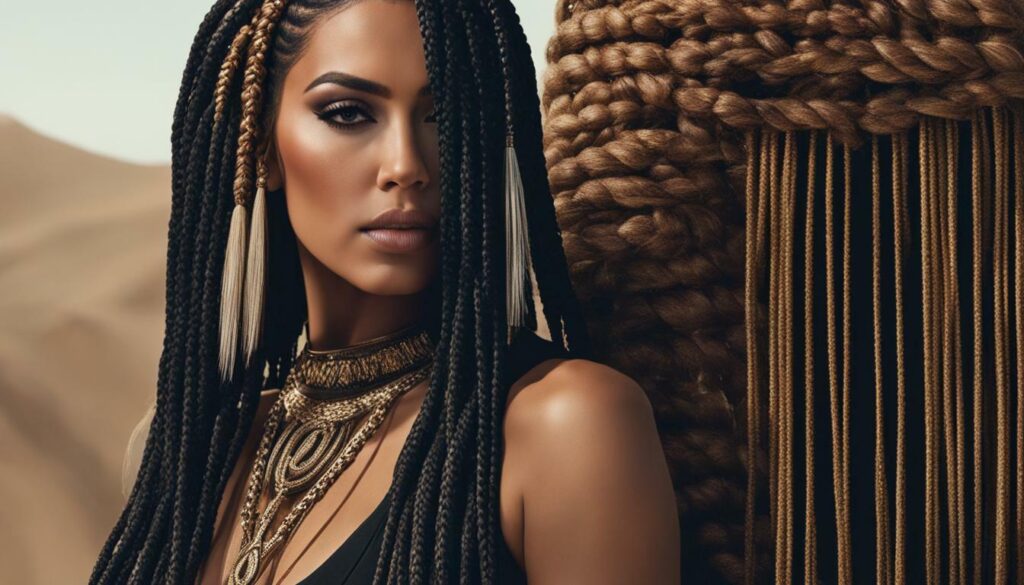
In February 2018, Kim Kardashian sparked controversy when she referred to box braids as “Bo Derek braids.” This statement ignited a heated debate on cultural appropriation, as box braids are a traditional hairstyle originating from the Fulani people of West Africa. The choice of naming the braids after the white actress who popularized them in the 1979 film “10” was seen as an erasure of the cultural significance of the hairstyle.
Kim Kardashian faced criticism for appropriating black culture and neglecting to acknowledge the Braids’ true name, Fulani braids. In response, she defended herself by stating that she was aware of the origin and called them Bo Derek braids only because her daughter North wanted to have matching hairstyles. However, this explanation did not quell the controversy surrounding her choice of words and the implications it had on cultural appreciation versus appropriation.
Key Takeaways:
- Kim Kardashian caused controversy by referring to box braids as “Bo Derek braids,” a name that erases the cultural heritage of the hairstyle.
- The hairstyle, known as Fulani braids, has its roots in the Fulani people of West Africa.
- Accusations of cultural appropriation highlight the need for understanding and respecting the origins and significance of different hairstyles.
- The issue of cultural appropriation extends beyond the naming of a hairstyle and encompasses the broader erasure and appropriation of black women’s beauty.
- The controversy emphasizes the importance of promoting conversations that celebrate and appreciate diverse cultural heritages.
Kim Kardashian’s Approach to Box Braids and Cultural Appropriation
Despite the backlash, Kim Kardashian defended her choice to wear box braids and addressed the accusations of cultural appropriation. In February 2018, she ignited controversy when she referred to the style as “Bo Derek braids,” erasing the cultural origins of box braids. This sparked accusations of cultural appropriation, as box braids are a protective hairstyle originating from the Fulani people of West Africa.
In response to the criticism, Kim acknowledged that she knew the proper name for the braids was Fulani braids and stated that she understood their origin. She explained that she wore the braids to match her daughter North, who expressed a desire for braids. However, it is important to note that the issue of cultural appropriation extends beyond just one person wearing a hairstyle. It raises concerns about the erasure and appropriation of black women’s beauty.
The controversy surrounding Kim’s choice to wear box braids resurfaced when she attended the Yeezy Season 8 presentation during Paris Fashion Week, sporting a different style of braids. While some argued that she was simply experimenting with different hairstyles, others criticized her for continuously appropriating a culturally significant hairstyle without fully appreciating its origins and cultural significance.

It is crucial to have meaningful conversations about cultural appropriation and to educate ourselves about the origins and cultural significance of hairstyles. By doing so, we can avoid perpetuating harmful stereotypes and erasing the contributions of marginalized communities. Instead, we should appreciate and celebrate the diversity of beauty and hairstyles, giving credit where it is due and fostering a more inclusive and respectful environment.
| Kim Kardashian, box braids, hairstyle, Fulani braids, controversy, cultural appropriation, erasure, black women’s beauty |
|---|
Conclusion
The controversy surrounding Kim Kardashian’s naming of box braids brings attention to the importance of cultural awareness and appreciation in the realm of fashion and beauty. In February 2018, when Kim referred to box braids as “Bo Derek braids,” it ignited a heated debate about cultural appropriation. Box braids are actually a protective hairstyle originating from the Fulani people of West Africa, and many saw Kim’s choice of name as erasing their cultural significance.
In response to the backlash, Kim stated that she knew the braids were called Fulani braids and understood their origin. She mentioned that she wore the braids to match her daughter North, who wanted braids herself. While this explanation may have shed light on her intentions, it did not alleviate the concerns of those who felt that Kim was appropriating a hairstyle deeply rooted in black women’s beauty and history.
Kim’s decision to wear a different style of braids to the Yeezy Season 8 presentation during Paris Fashion Week further fueled the controversy. This incident highlighted the ongoing issue of cultural appropriation in the fashion industry, where certain styles are celebrated on non-black individuals while black women are often marginalized and excluded from the same recognition.
Ultimately, the debate surrounding Kim Kardashian’s box braids serves as a reminder of the importance of respecting and acknowledging the cultural origins of hairstyles. It calls for a greater understanding and appreciation of the beauty and significance that these styles hold within specific communities. By engaging in conversations that celebrate and uplift black women’s beauty, we can work towards a more inclusive and culturally aware fashion and beauty industry.
FAQ
What did Kim Kardashian call box braids?
Kim Kardashian referred to box braids as “Bo Derek braids” in February 2018.
How did Kim Kardashian respond to the backlash?
Kim Kardashian stated that she knew the braids were called Fulani braids and understood their origin. She also mentioned that she wore the braids to match her daughter North, who wanted braids.
Why did Kim Kardashian face criticism again for wearing a different style of braids?
Kim Kardashian received criticism when she wore a different style of braids to the Yeezy Season 8 presentation during Paris Fashion Week. This reignited the debate surrounding cultural appropriation and the erasure of black women’s beauty.
What broader issues does the controversy raise?
The issue of cultural appropriation extends beyond just who wore a hairstyle first; it raises concerns about the erasure and appropriation of black women’s beauty. It highlights the need for awareness and understanding of the cultural significance behind hairstyles.






